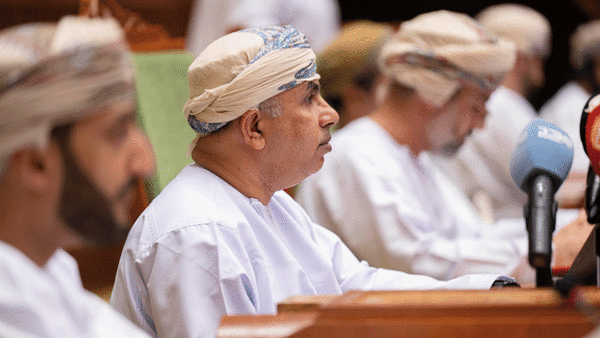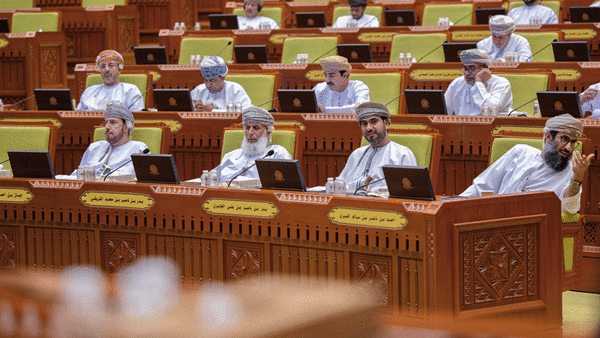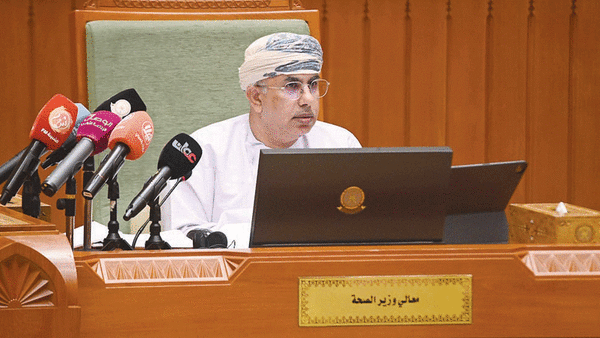

Dr Hilal bin Ali al Sabti, Minister of Health, has said that the ministry has embarked on a number of projects and initiatives to meet demand in accordance with current and future priorities. The minister delivered his ministry’s statement as the Majlis Ash’shura’s hosted him uring its 13th ordinary meeting on Sunday.
Assuring the public that efforts are being made to speed up delayed hospital appointments, the minister said: “We were able to reduce the waiting period for appointments so that 70 per cent of patients can now get their first appointment within four weeks, compared to 30 per cent previously.” He also assured that the shortage of medical personnel is addressed, and lack of medicine supply in hospitals is covered. The shortage of medicines, according to him, is a global problem caused by various manufacturing issues faced by pharmaceutical companies around the world.
In order to ensure adequate supply of medications, the ministry is taking a variety of measures to address the issue, Dr Al Sabti said.
The ministry is working on developing supply chains for medicines and medical supplies by introducing modern technologies into supply chains. It continues to establish and expand medical warehouses in the governorates, similar to the medical warehouses in Dhofar and Al Dakhiliyah governorates. Efforts are under way to establish a regional warehouse in Musandam Governorate. The ministry maintains a reserve stock that covers consumption for approximately three to six months of vital and life-saving items.

HEALTH COVERAGE
The ministry also pledged to continue providing high standard healthcare and develop a world-class health system.
The statement of the minister covered four themes: comprehensive health coverage, funding the health system, human resources and digital transition.
The minister pointed out that the projects seek to consolidate decentralisation of health services by providing a package of specialised services at referral hospitals. To meet this objective, about 240 new specialised services have been introduced in hospitals and health complexes, he added.
The new projects include the establishment and replacement of 13 hospitals with a capacity ranging between 50 and 700 beds. This raises the number of hospitals affiliated to the Ministry of Health to 64, said Dr Al Sabti, noting that 18 primary healthcare institutions have been set up or developed to meet population growth.
The ministry is currently expanding five hospital (adding 600 additional beds) and upgrading the level of three health centres into local hospitals, he said. This is in addition to the establishment and expansion of eight emergency units and construction of nine dialysis units, he added.
The minister said that the projects being implemented include the setting up of a central laboratory, a regional warehouse in Musandam Governorate, two centres for recovery from addiction in the governorates of Muscat and Al Batinah North and a national centre for organ transplantation.

NUMBER OF WORKERS
The minister said that the total number of workers at the Ministry of Health by the end of 2021 stood at 37,732. This accounts for a fall of 2.2 per cent, he observed, noting that, despite this the overall percentage of Omanisation remained at 73 per cent in 2021.
Dr Al Sabti stated, “Due to the growth of private clinics in Muscat Governorate, we have suspended establishment of new clinics to monitor the existing ones and follow up on them.” He also mentioned that some centres have been suspended and that a female doctor practising without a license has been fired.
POSITIVE RESULTS
Citing other facts, the minister said that the spread of coronavirus (Covid-19 pandemic) prolonged patient waiting lists and postponed outpatient appointments and surgical interventions. This, he said, prompted the ministry to take contingency measures to address the problems and to reduce pressure. These measures yielded positive results, he added.
The ministry conducted a study on the rate of sudden deaths in the Sultanate of Oman. The results indicated that the rate is normal and comparable to that of other countries in the world, he said, adding that the increase in deaths during the recent period was due to the pandemic. The curve of deaths cannot be proven or predicted.
FUNDS
Speaking about funding issues, Dr Al Sabti stressed that the ministry has augmented the budget set for the strategic stock of medicines and medical supplies to RO 10 million. The aim is to ensure that enough supplies are in place to meet emergency conditions, stave off the effects of epidemics and disasters and, eventually, protect the health of citizens.
In his statement the minister said that, by the end of last year, Oman had a suitable number of projects that support the pharmaceutical and medical sectors. Those included 14 factories, seven of which for medical drugs and 7 for medical supplies, others factories, he said. He added that nine more factories are under construction, of them 7 for pharmaceutical products and 2 for medical supplies.
The Ministry of Health is also implementing a National Strategy for Digital Transition, said the minister. He indicated that the strategy is being conducted through the automation, digitisation and computerisation of its digital systems.
Speaking in detail, the minister said that digital transformation projects include the establishment of a National Centre for Virtual Medical Services and an Electronic Repository for Digital X-rays and Diagnostic Procedures.
This is in addition to a project for medical prescriptions and drug tracking and another for re-engineering and designing a healing system, he said.
HUMAN RESOURCES
The upcoming challenge in the healthcare sector is that of human resources, so efforts must be made not to lose these resources and to provide qualification and training, not only for general physicians but also for specialised staff. Training depends on the number of beds and trainers.
On the achievements of the ministry, the Minister of Health said that a dialysis unit will be set up in the Wilayat of Barka as the ministry has approved the project. Due to high population density in the wilayat, Barka Health Complex has opened several new clinics, such as male infertility, ophthalmology, travel medicine, and counselling, among others.
The foundation-stone for Mahout Hospital in Al Wusta Governorate will be laid in June next year. The recently-built Sultan Qaboos Hospital in Salalah has 700 beds and offers a comprehensive range of medical specialities. This hospital is expected to be on par with the Royal Hospital regarding its specialised services. Bahla Hospital will be among the top four priorities to be considered in 2024.
There is a forthcoming plan and initiative to open the Jaalan Bani Bu Ali Health Centre for 24 hours in the near future. A team of specialists will visit the physical therapy unit at Qurayat Hospital to assess its needs.
Oman Observer is now on the WhatsApp channel. Click here



